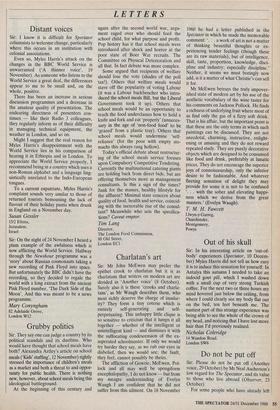Charlatan's art
Sir: Mr John McEwen may prefer the epithet crook to charlatan but it is as charlatans that writers on modern art are derided in 'Another voice' (8 October). Surely also it is these 'crooks and charla- tans', as Mr Waugh describes them, who most richly deserve the charge of insular- ity? They form a tiny coterie which is entirely self-generating and self- perpetuating. This unhappy little clique is so sensitive to criticism that it lumps it all together — whether of the intelligent or unintelligent kind — and dismisses it with the suffocating condescension of the ex- asperated schoolmaster. If only we would try harder they say, as we rub our eyes in disbelief, then we would see; the fault, they feel, cannot possibly be theirs.
The affliction of Gowrie, McEwen, Pol- lock and all may well be spongiform encephalopathy, I do not know — but from my meagre understanding of Evelyn Waugh I am confident that he did not suffer from this ailment. On 18 November 1960 he had a letter published in the Spectator in which he made the memorable comment: . . a work of art is not a matter of thinking beautiful thoughts or ex- periencing tender feelings (though these are its raw materials), but of intelligence, skill, taste, proportion, knowledge, disci- pline and industry; especially discipline.' Neither, it seems we must boringly now add, is it a matter of what Christie's can sell it for.
Mr McEwen betrays the truly impover- ished state of modern art by his use of the aesthetic vocabulary of the wine taster for his comments on Jackson Pollock. He finds a richness of underlying fruit where most of us find only the gas of a fizzy soft drink. That is his affair, but the important point is that these are the only terms in which such paintings can be discussed. They are not anecdotal, charming, instructive, enlight- ening or amusing and they do not reward repeated study. They are purely decorative objects which are designed to be consumed like food and drink, preferably at lunatic prices. They do not encourage the superior joys of connoisseurship, only the inferior desire to be fashionable. And whatever fleeting sensation of delight they may provide for some it is not to be confused . . with the sober and elevating happi- ness which we derive from the great masters.' (Evelyn Waugh).
T. M. H. Fawcett
Liwyn-ylGarreg, Churchstoke, Montgomery, Powys










































































































 Previous page
Previous page